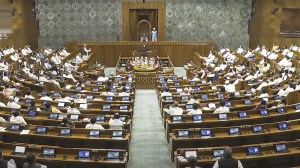Murder, justice & political change: Sneha Dube ends 35 years of Thakur family control in Maharashtra’s Vasai
Sneha’s victory in Vasai by 3,153 votes has not only upset Hitendra Thakur but also ensured that no member of the Thakur family occupied a seat in the Maharashtra State Assembly first time since 1990.
 Tensions between the Thakurs and the Dubes escalated in October 1989, centered around a land deal in Achole village. (Express)
Tensions between the Thakurs and the Dubes escalated in October 1989, centered around a land deal in Achole village. (Express)On October 9, 1989, Suresh Narsinh Dube, a 33-year-old real estate developer, was shot in broad daylight around 10.30 am at Nalasopara railway station. This murder is believed to have been the catalyst that solidified the Thakur family’s control over the socio-political landscape of the Vasai-Virar belt, located at the northernmost tip of the Mumbai Metropolitan Region. Nearly 35 years later, Sneha Dube Pandit, a 38-year-old relative of the late Suresh Dube, has handed Hitendra Thakur, the patriarch of the Thakur clan, his first political defeat.
Sneha’s victory in Vasai by 3,153 votes has not only upset Hitendra Thakur but also ensured that no member of the Thakur family occupied a seat in the Maharashtra State Assembly first time since 1990. This shift is viewed as a major blow to the Thakur family’s decades-long dominance over the region. Hitendra Thakur, the patriarch of the family and a six-time MLA from Vasai, leads the Bahujan Vanchit Aghadi (BVA), a political party with significant influence in the semi-urban areas of Virar, Vasai, and Nalasopara in Palghar district. The Thakur family’s extensive business interests permeate almost every local enterprise, further solidifying their control over the area.
The Thakurs have long been the dominant political family in the Vasai-Virar belt, a power that was established by Jayendra Thakur, also known as Bhai Thakur. In the late 1980s, the Vasai-Virar region, once a quiet, rural enclave, was undergoing rapid change as the burgeoning population of Bombay began spilling over into the coastal belt.
This rapid urban expansion spurred a surge in real estate activity, turning land development and building construction into a highly lucrative business. However, this boom also led to a rise in illegal activities such as land-grabbing and the forcible takeover of properties. Police records from that period indicate the involvement of three major gangs — the Suresh Dube gang, the Bhai Thakur gang, and the Manik Patil gang. While the Thakur gang and the Manik Patil gang formed an alliance, the Dube brothers — particularly Shyam Sundar Dube and Suresh Dube, had distanced themselves from illegal activities in the late 1980s and shifted their focus to the legitimate business of land development and construction.
Tensions between the Thakurs and the Dubes escalated in October 1989, centered around a land deal in Achole village. According to a police chargesheet, the Thakurs coveted a parcel of land that the Dubes purchased. Suresh Dube and Dr Omprakash Dube visited the Thakur family’s office, where Bhai Thakur, his brother Hitendra Thakur, and other associates were present. During the meeting, the Thakurs demanded that the Dubes relinquish the land and pay a “hafta” (protection money).
“Suresh Dube was even threatened and warned that if he did not comply with that demand and took any other action, then the members of his family shall have to perform ‘aarti’ of his photo within a short time,” the police chargesheet states.
Police believe this confrontation led to a conspiracy to eliminate Suresh Dube, with the Thakurs allegedly enlisting the Manik Patil gang to carry out the murder. On October 9, 1989, Suresh Dube and his brother-in-law, Amarnath Tripathi, were at Nalasopara station when they were shot dead by members of the Manik Patil gang.
An investigation was initiated by the Palghar police, leading to the arrest of two persons, Patrick Frances Truskar and Ananda Ramachandra Patil, who were held responsible for the murder. However, there were claims that the police had pressured the Dube family into not naming the Thakur family in connection with the crime.
Chargesheet was filed against the two accused and they were put on trial before the sessions court in Thane. However, the case stalled when both accused were released on bail, and no significant efforts were made by the police to secure their presence in court by issuing warrants.
During this period, Hitendra Thakur, at the age of 29, was elected as a Congress MLA, just four months after the murder, while the investigation and trial in the murder case went cold.
In February 1992, 28 months after the crime, the then DIG of the Railway Police, Sudhakar Suradkar, stumbled upon the case files and reopened the investigation. The police records state that Suradkar became suspicious of the investigation’s integrity and the identity of the real perpetrators. This led him to meet with the Dube family, whose mother and sister-in-law voiced concerns about the police’s involvement in the case.
A fresh investigation was launched, and a total of 17 people were charged under the Terrorist and Disruptive Activities (Prevention) Act in connection with the murder. Among those arrested were Bhai Thakur, his younger brother and then Vasai MLA Hitendra Thakur, who surrendered to the police in January 1993. Additionally, at least three serving police officers were implicated.
In the mid-1990s, an initial trial resulted in the acquittal of all 17 individuals, including Hitendra Thakur, even as he continued his political career and won elections as an independent candidate. However, in 2000, a Supreme Court appeal overturned the acquittals of several of the accused. After the filing of a supplementary chargesheet, a new trial began in the early 2010s, including against Bhai Thakur, who was ultimately acquitted in May 2023. The Dube family has since challenged this acquittal in the Supreme Court.
Even as the trial dragged on for nearly three decades, the Thakur family’s political and economic influence remained unchallenged in the Vasai-Virar region. Hitendra Thakur, a six-time MLA from Vasai, continued to dominate the area, with his party, the BVA, maintaining control of the Vasai-Virar Municipal Corporation. The only election in which Thakur did not represent Vasai was in 2009, when he chose not to contest. That year, Vivek Pandit, a prominent social activist and leader of Shramjeevi Sanghatna — an organisation focused on the rights of workers and tribals — won as an Independent candidate, supported by the undivided Shiv Sena. Pandit’s victory over the BVA candidate marked a rare defeat for the Thakur political machine, but Hitendra Thakur’s own electoral record remained intact.
As the 2024 elections approached, the Thakurs were confident of another victory, having attracted national attention after accusing BJP national general secretary Vinod Tawde of distributing money ahead of the polls. However, the unexpected intersection of the Pandit and Dube families — two of the Thakurs’ most vocal opponents — led to Hitendra Thakur’s first-ever defeat and the worst performance by his party in recent memory, with his son, Kshitij Thakur, also losing.
Sneha Pandit Dube, a lawyer and activist who had been involved in social work through her father’s Shramjeevi Sanghatna, emerged as the formidable challenger. Married to Premnath Dube, the elder son of Shyam Sundar Dube and the main complainant in the murder case of Suresh Dube, Sneha contested on a BJP ticket. She framed her campaign around liberating the people of Vasai from the “terror” that had gripped the region under the Thakur family’s influence for over three decades.
“Basic needs of the locals have been neglected. Water is a huge issue here — certain areas still rely on hard water from borewells. Some urban areas only receive water once every two days, with some societies running up bills of up to Rs 8 lakh for water tankers. My focus is to address this,” Pandit stated during her election campaign.
On her family’s legal battle with the Thakurs, she emphasised that their pursuit of justice would continue. “The Dube family has been fighting a legal battle for the last 35 years. The case is still pending before the Supreme Court. After losing a family member, the fact that the entire family has come together to fight the terror unleashed in this region is a huge inspiration for me. We will continue our fight until we get justice. As for me, I am also engaged in an ideological battle against my adversaries,” Pandit said after her victory.












